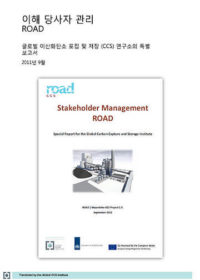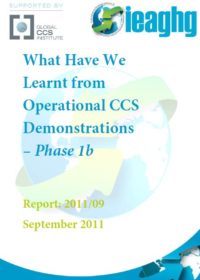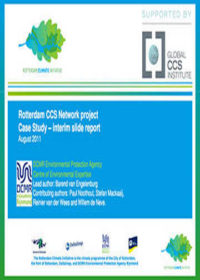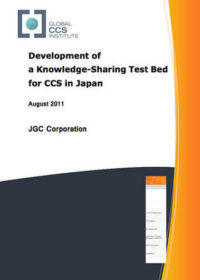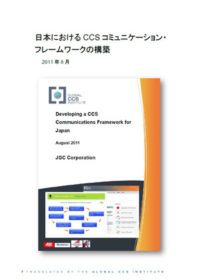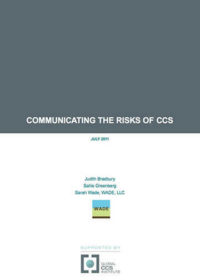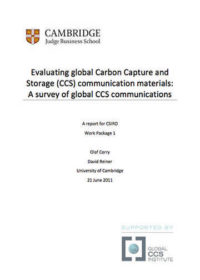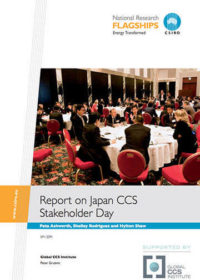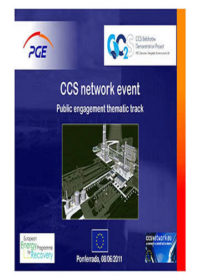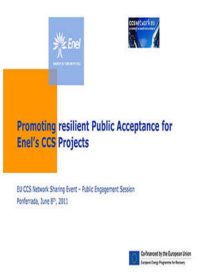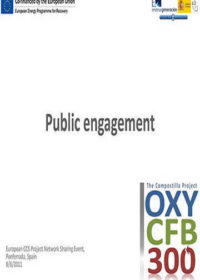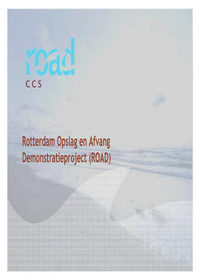Resources
Publications
Our publications, reports and research library hosts over 500 specialist reports and research papers on all topics associated with CCS.
View our Publication Library Disclaimer.
Filter by
이해 당사자 관리 ROAD
1st September 2011
Topic(s): Carbon capture use and storage (CCUS), Communication, Public engagement
Disclaimer
The content within the Global CCS Institute Publications, Reports and Research Library is provided for information purposes only. We make every effort and take reasonable care to keep the content of this section up-to-date and error-free. However, we make no claim as to its accuracy, currency or reliability.
Content and material featured within this section of our website includes reports and research published by third parties. The content and material may include opinions and recommendations of third parties that do not reflect those held by the Global CCS Institute.
What have we learnt from operational CCS demonstrations: phase 1b
1st September 2011
Topic(s): Carbon capture use and storage (CCUS), Permitting, Public engagement
An assessment of the learning that is being provided by operational, large-scale CCS (carbon dioxide capture and storage) projects around the world was undertaken by the IEA Greenhouse Gas R&D Programme (IEAGHG, 2009). This second consultation round (phase 1b) intends to add additional information to the original report on: well injectivity, regulation and permitting and public communication.
Disclaimer
The content within the Global CCS Institute Publications, Reports and Research Library is provided for information purposes only. We make every effort and take reasonable care to keep the content of this section up-to-date and error-free. However, we make no claim as to its accuracy, currency or reliability.
Content and material featured within this section of our website includes reports and research published by third parties. The content and material may include opinions and recommendations of third parties that do not reflect those held by the Global CCS Institute.
Rotterdam CCS Network Project. Case study: interim slide report
1st August 2011
Topic(s): Carbon capture use and storage (CCUS), CO2 hubs, Public engagement
This slide report presents the interim results of the case study conducted to make explicit the history and lessons learnt of the Rotterdam CCS Network Project.
The Rotterdam Climate Initiative (RCI) is in the process of realising CCS in the Rotterdam area, the Netherlands. CCS activities in Rotterdam commenced in 2006 and until now, more than 20 companies cooperated to provide feasibility level engineering studies for CO2 capture projects and a CCS common infrastructure network. The Rotterdam CCS Network Project can be characterised by:
- a broad cooperation between parties, with active commitment of industrial organisations;
- a vision that transcends single-source-single-sink projects and aims at a network, a hub function and focuses on the whole CCS chain of CCS; encompassing technology and organisational, legal and financial issues; and
- a local (political) commitment to a long term approach towards CCS deployment which transcends the region of Rotterdam.
The Rotterdam CCS Network project has experiences in a large number of fields that are considered highly relevant to other CCS projects: i.e. use of goals and means; internal organisation; cooperation with industry, authorities and other stakeholders; technical, financial, legal and communication aspects; and lobbying.
Together the RCI and the Institute phrased the following two objectives for a case study: discover the lessons learnt from Rotterdam useful for the support of CCS projects around the globe; and improvement of the Rotterdam CCS project itself.
Disclaimer
The content within the Global CCS Institute Publications, Reports and Research Library is provided for information purposes only. We make every effort and take reasonable care to keep the content of this section up-to-date and error-free. However, we make no claim as to its accuracy, currency or reliability.
Content and material featured within this section of our website includes reports and research published by third parties. The content and material may include opinions and recommendations of third parties that do not reflect those held by the Global CCS Institute.
Developing a CCS communications framework for Japan
1st August 2011
Topic(s): Carbon capture use and storage (CCUS), Communication, Public engagement
In partnership with the Global CCS Institute, JGC Corporation, Quintessa, National Institute of Advanced Industrial Science and Technology (AIST) and McKinley Consulting established and have been running a knowledge sharing network amongst several of the Institute’s Japanese Members since December 2010.
As a part of the network’s initial project, Developing a CCS Communications Framework for Japan, several major Japanese organisations involved with CCS have collaborated to explore:
- how the Institute and its Members can collaborate to synthesise expert knowledge relating to issues identified, which is distributed over a wide variety of disciplines/research areas, into a coherent body of knowledge; and
- how the Institute can distill detailed expert knowledge and present it in a simpler form that can be understood by stakeholders with different levels of scientific/technical literacy.
This report sets out the main outputs of the Network's pilot phase, including:
- establishment of a community of key staff from interested organisations, procedures for facilitating knowledge sharing and required communication tools, i.e., the Institute’s digital platform;
- specification of (possibly Japan-specific) requirements for promotion of CCS understanding;
- compilation of a knowledge base of past communication efforts and an assessment of their effectiveness;
- development of an action plan for improving CCS understanding and stakeholder participation in national dialogue; and
- development of an ‘Argumentation model’ supporting CCS in Japan.
Other Phase Reports
- CCS communications framework developed by the Japanese Knowledge Network - Phase 2, October 2013
- Development of a CCS communications framework for Japan (phase 3) - Phase 3, June 2014
Disclaimer
The content within the Global CCS Institute Publications, Reports and Research Library is provided for information purposes only. We make every effort and take reasonable care to keep the content of this section up-to-date and error-free. However, we make no claim as to its accuracy, currency or reliability.
Content and material featured within this section of our website includes reports and research published by third parties. The content and material may include opinions and recommendations of third parties that do not reflect those held by the Global CCS Institute.
日本におけるCCSコミュニケーション・フレームワークの構築
1st August 2011
Topic(s): Carbon capture use and storage (CCUS), Communication, Public engagement
知識の共有は、CCSコミュニティにとって必要不可欠であり、グローバルCCSインスティテュートが中心的役割を演じている分野である。「日本におけるCCSコミュニケーション・フレームワークの構築」というこのプロジェクトは、国際的な環境でより幅広くこの手法を利用する事を前提に、パイロット規模で知識管理システム(KMS)のプロトタイプを検証すること目標としており、主なテーマは以下のとおりである。
- 特定された問題に関して、様々な学問領域/研究分野に分布している専門知識を、インスティテュートおよびそのメンバーが協力して、どのように有機的な知識体系に統合するか
- グローバルCCSインスティテュートがどのように詳細な専門知識の本質を洗い出し、それを様々なレベルの科学・技術水準を有する利害関係者が理解できる簡潔な形で示すか
コミュニティーメンバーとの共同作業から得られた主なアウトプットは以下のとおりである
- 利害関係団体の重要な人員から成るコミュニティ、知識の共有を促進する手順、および必要なコミュニケーションツール、すなわちインスティテュートのデジタルプラットフォームを確立すること
- CCSの理解を促進するための(おそらく日本固有の)要件の特定
- 過去のコミュニケーションの努力と、その有効性の評価に関する知識ベースをまとめる
- CCSへの理解を向上させ、国内での対話への利害関係者の参加を促すためのアクションプランの作成
- 日本においてCCSをサポートする「アーギュメンテーション(討論)モデル」の開発
Disclaimer
The content within the Global CCS Institute Publications, Reports and Research Library is provided for information purposes only. We make every effort and take reasonable care to keep the content of this section up-to-date and error-free. However, we make no claim as to its accuracy, currency or reliability.
Content and material featured within this section of our website includes reports and research published by third parties. The content and material may include opinions and recommendations of third parties that do not reflect those held by the Global CCS Institute.
Communicating the risks of CCS
1st July 2011
Topic(s): Carbon capture use and storage (CCUS), Communication, Public engagement
Developing an understanding of how people view CCS technology can, in turn, help in developing effective programs for risk communication. This is important because it can form the basis for working with the public to develop projects.
Understanding the way in which people evaluate project risks is a topic that has been studied extensively in the social science literature, and we are now gaining direct experience from early CCS projects.
This report aims to provide a better understanding of what we have learnt about the ways in which people view risk more expansively than just a technical and scientific assessment would indicate and the importance of addressing this view. The report builds on previous work including a communications / engagement toolkit for CCS projects and a social site characterisation toolkit. It is intended to assist those involved in the planning and implementation of CCS projects to develop more effective and productive stakeholder engagement programs.
The report is broken down into the different sections – covering various aspects of risk and communications: following the introduction, Part 2 of the report reviews the theoretical underpinnings for an approach to risk communication. For Part 3, the authors interviewed representatives from five North American CCS projects to review project experience in risk communication and summarise lessons learnt from those experiences. Based on these lessons, the authors suggest, in Part 4, an iterative five-step strategy for learning how the community views the project and for developing effective risk communication programs. This final part also provides the reader with a series of pointers and resources for use in developing risk communication programs.
Disclaimer
The content within the Global CCS Institute Publications, Reports and Research Library is provided for information purposes only. We make every effort and take reasonable care to keep the content of this section up-to-date and error-free. However, we make no claim as to its accuracy, currency or reliability.
Content and material featured within this section of our website includes reports and research published by third parties. The content and material may include opinions and recommendations of third parties that do not reflect those held by the Global CCS Institute.
Evaluating global carbon capture and storage (CCS) communication materials: a survey of global CCS communications
21st June 2011
Topic(s): Carbon capture use and storage (CCUS), Communication, Public engagement
CCS communications are likely to play a crucial part in determining what kind of role CCS eventually ends up playing in the energy and climate infrastructures currently being planned and built around the world. With CCS not yet operating on a commercial scale, CCS communications via media coverage, visits to science museums, and especially websites, make up a significant part of the ‘CCS’ that most people will experience. As Hammond and Shackley (2010) point out, the images and presentation of CCS, more than actual CCS infrastructure or experiences with CCS, make up what CCS means to most people at the present time. The importance therefore of questions about how CCS is being communicated becomes imperative, specifically, how such communication is, and may be, developing and where it might be enhanced and improved in the future.
This report reviews the scope and key characteristics of carbon dioxide capture and storage (CCS) communications and primarily builds upon a comprehensive Global CCS Communications Database that was compiled for this project. The report also draws upon investigations of non-web sources, including books, articles, media reporting of CCS, educational materials and museum exhibits, to provide as varied and comprehensive an overview as possible of CCS communication practices to date.
The headline findings are:
- Overall, progress is slow and sporadic but gradually building in scale and scope.
- The focus is still on how CCS works, rather than how it might be made to work and the overall benefits.
- Transport is the ‘invisible’ technology.
- There is a heavy reliance on climate change as the sole rationale justifying CCS.
- A large majority of CCS communications material is overtly positive.
- Communications by research institutions are usually narrowly technical, but more critical sources tend to focus on a wider set of issues, especially social concerns.
- The Internet remains the focus for CCS communication.
- English remains the primary language of CCS communication.
- The ‘one-size-fits-all’ approach limits potential usefulness to many groups.
- Educational materials are being developed but only slowly.
Disclaimer
The content within the Global CCS Institute Publications, Reports and Research Library is provided for information purposes only. We make every effort and take reasonable care to keep the content of this section up-to-date and error-free. However, we make no claim as to its accuracy, currency or reliability.
Content and material featured within this section of our website includes reports and research published by third parties. The content and material may include opinions and recommendations of third parties that do not reflect those held by the Global CCS Institute.
Report on Japan CCS stakeholder day
15th June 2011
Topic(s): Carbon capture use and storage (CCUS), Public engagement
Professor Joop van der Pligt from the University of Amsterdam provided a keynote address focusing on issues relating to risk and risk perception of the lay public in the face of uncertain technologies. Dr Kenshi Itaoka then presented an update on the local Japanese context for CCS based on results from his longitudinal research on public perception and awareness. Findings from a number of project case-studies were then presented for discussion, followed by a workshop on a Communications and Engagement Toolkit for CCS Projects.
Thematic analyses of the discussions that occurred over the course of the day revealed a number of considerations that were relevant to the theme of communication and public acceptance of CCS. The major themes included:
- the importance of cultural identity and its influence on public acceptance in Japan;
- issues relating to the different considerations for offshore and onshore storage particularly because of Japan’s potential for earthquakes;
- considerations around the potential benefits that CCS projects may bring and whether there were any likely compensation models that may be applicable in the Japanese context;
- the role of NGOs in Japan;
- the importance of transparency of information that is communicated;
- the value of case studies for knowledge sharing; and
- the need for education materials and more consideration and priority to be given to developing a positive image for CCS.
Disclaimer
The content within the Global CCS Institute Publications, Reports and Research Library is provided for information purposes only. We make every effort and take reasonable care to keep the content of this section up-to-date and error-free. However, we make no claim as to its accuracy, currency or reliability.
Content and material featured within this section of our website includes reports and research published by third parties. The content and material may include opinions and recommendations of third parties that do not reflect those held by the Global CCS Institute.
CCS network event: Public engagement thematic track
8th June 2011
Topic(s): Carbon capture use and storage (CCUS), Public engagement
Disclaimer
The content within the Global CCS Institute Publications, Reports and Research Library is provided for information purposes only. We make every effort and take reasonable care to keep the content of this section up-to-date and error-free. However, we make no claim as to its accuracy, currency or reliability.
Content and material featured within this section of our website includes reports and research published by third parties. The content and material may include opinions and recommendations of third parties that do not reflect those held by the Global CCS Institute.
Promoting resilient public acceptance for Enel’s CCS projects
8th June 2011
Topic(s): Carbon capture use and storage (CCUS), Public engagement
Disclaimer
The content within the Global CCS Institute Publications, Reports and Research Library is provided for information purposes only. We make every effort and take reasonable care to keep the content of this section up-to-date and error-free. However, we make no claim as to its accuracy, currency or reliability.
Content and material featured within this section of our website includes reports and research published by third parties. The content and material may include opinions and recommendations of third parties that do not reflect those held by the Global CCS Institute.
Public engagement: Compostilla project
8th June 2011
Topic(s): Carbon capture use and storage (CCUS), Public engagement
Disclaimer
The content within the Global CCS Institute Publications, Reports and Research Library is provided for information purposes only. We make every effort and take reasonable care to keep the content of this section up-to-date and error-free. However, we make no claim as to its accuracy, currency or reliability.
Content and material featured within this section of our website includes reports and research published by third parties. The content and material may include opinions and recommendations of third parties that do not reflect those held by the Global CCS Institute.
ROAD project public engagement update
8th June 2011
Topic(s): Carbon capture use and storage (CCUS), Public engagement
Disclaimer
The content within the Global CCS Institute Publications, Reports and Research Library is provided for information purposes only. We make every effort and take reasonable care to keep the content of this section up-to-date and error-free. However, we make no claim as to its accuracy, currency or reliability.
Content and material featured within this section of our website includes reports and research published by third parties. The content and material may include opinions and recommendations of third parties that do not reflect those held by the Global CCS Institute.
